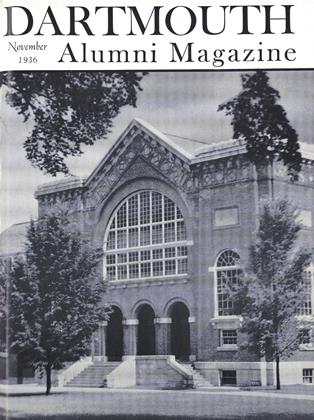HARVARD and Yale week-ends, followed by Fall Houseparties and the Columbia game, subject a majority of undergraduates to an economic and physical strain with occasional repercussions extending from family circles to the Administration Building. Holy Cross, despite the unfortunate score, did wonders in strengthening hopes in Hanover that had hovered dangerously close to prayers, and although wind and rain that week-end destroyed much of the colorful foliage on Vermont hills, Dartmouth at last took on the fall football atmosphere in earnest.
Hanover had the appearance of a houseparty week-end the day of the Holy Cross game, with 15,000 spectators armed with raincoats and bath-towels filling the stands and absorbing the last nickel's worth of food offered for sale by the Rowing Club. Cheering has taken a turn for the better since seven cheerleaders have shouted and performed, making a noticeable supplement to the band, and coaxing more and more detibles from the Dartmouth stands in the form of Indian yells and Dartmouth Skyrockets. The Barbary Coast played for a tea dance in the Trophy Room of the gym after the game, in line with the Social Survey committee suggestion that the number of social functions in Hanover which the entire student body could attend be increased. Meanwhile the throngs passing through the Tower Room and commenting on the frescoes continued with as much enthusiasm as ever, punctuated by an occasional exhibitionist who would insist on parading his guest up to the extreme end of the study halls and back.
While fall sports and the World Series held the spotlight, the Dartmouth Union and Green Key carried on a program of humanizing the faculty, with less tangible, but apparently beneficial results. The freshman feeds this year were qualified to destroy the stereotype of the professor as a black-robed pedagogue, and encourage more informal contacts between students and faculty, long a recognized need on the campus.
The keynote of the program has been informality, with five feeds each week held in a special room of the renovated Commons at the regular supper hour, with a different dormitory group and a different faculty speaker each time. The freshmen have been treated in Rotary Club manner, introduced to each other and name tags pinned to their lapels, while the speaker did his best to appear human. Talks have been built around the general topic "The Faculty as Human Beings," or some associated subject emphasizing informality. Each meeting has stressed the advantage of a wide acquaintance and of group spirit, with the dormitory chairman urging the freshmen to know each other and work together in dormitory athletics and activities. Planned to last only a short time, the suppers have usually been prolonged an extra hour while the freshmen took advantage of the professor's invitation to become better acquainted.
Another more conspicuous innovation brought about by the Union this year is the Wednesday Forum, devoting the fifteen-minute chapel period once a week to a discussion of current problems. President Hopkins, continuing the standard of his Convocation address, appeared in Dartmouth Hall and condemned as the greatest weakness of undergraduate thinking "its tendency to simplify, to regard men and issues as 100% good or 100% bad." The following week Dr. Alberto Vasquez of the Spanish department sketched the political turmoil of his native land, and suggested that the Spanish temperament is unsuited to a republican form of government. Professor Stearns Morse, Farmer-Labor candidate for senator from New Hampshire predicted a national Farmer-Labor party by 1940, and Professor Irving E. Bender of the Psychology department described the delicate subject of current campaign propaganda.
Along vaguely similar lines with the work of the Union and Green Key is the required Social Science 1, aiming to give a liberal background to freshman education, and utilizing the whole Industrial Society staff and professors from all the social science departments. One immediate difficulty was to convince freshmen that the course was not to teach them any one school of thought, but to pass on knowledge necessary to think critically about current trends. For the first three weeks the chief reference book was A Primer for Tomorrow by Dean Gauss of Princeton, who spoke in Hanover, declaring that the struggle for riches and the over-emphasis of the "freedom to make a million dollars" is putting a "terrific strain on democracy." He incorporated in his lecture questions previously submitted by Social Science 1 students.
A View of the Overflow Crowd of 15,000 at the Dartmouth-Holy Cross Game
 View Full Issue
View Full Issue
More From This Issue
-
 Article
ArticleEat the Cake and Have It Too
November 1936 By WILLIAM J. MINSCH '07 -
 Class Notes
Class NotesClass of 1911
November 1936 By G. Burleigh -
 Class Notes
Class NotesClass of 1934
November 1936 By Martin J. Dwyer Jr -
 Class Notes
Class NotesClass of 1918
November 1936 By Allan C. Gottschaldt -
 Class Notes
Class NotesClass of 1921
November 1936 By Paul C. Belknap -
 Sports
SportsFollowing the Big Green Teams
November 1936 By ROBERT P. FULLER '37
William B. Rotch ’37
-
 Article
ArticleThe Undergraduate Chair
April 1937 By William B. Rotch ’37 -
 Class Notes
Class Notes1937
JANUARY 1963 By William B. Rotch ’37, FRANKLIN E. ROBIN -
 Class Notes
Class Notes1937
JUNE 1964 By William B. Rotch ’37, JEROME H. LOW -
 Class Notes
Class Notes1937
JUNE 1965 By William B. Rotch ’37, JEROME H. LOW -
 Class Notes
Class Notes1937
APRIL 1966 By William B. Rotch ’37, JEROME H. LOW -
 Class Notes
Class Notes1937
MAY 1966 By William B. Rotch ’37, JEROME H. LOW







